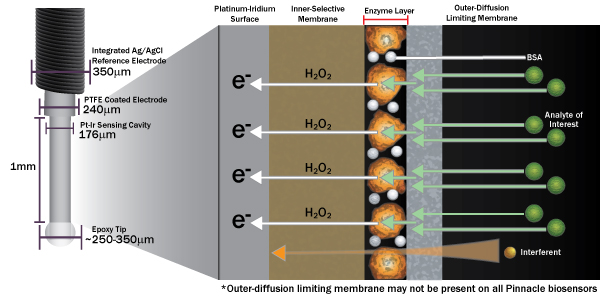Bioczujniki BASi/Pinnacle

Biosensors enable the monitoring of real-time changes in CNS neurochemical concentrations. Users may record and analyze second-by-second concentration changes of neurochemicals in the brains of freely-moving animals.
Currently, glutamate, glucose, lactate, and ethanol biosensors are available. Pinnacle biosensors function by the enzyme-mediated processing of the analyte of interest. This results in the production of hydrogen peroxide that is then detected by oxidation at a Pt-Ir electrode. Electroactive interferents, which are present in the brain, are excluded via a passive selective membrane and, when necessary, through active removal.
Carbon Fiber Sensors (CFSs) are used with BASi’s Raturn® or Culex® systems or Pinnacle’s tethered and wireless recording systems. CFSs are used to measure the presence of biogenic amines (e.g. dopamine) in the brain using fixed potential amperometry or fast scan cyclic voltammetry. Pinnacle CFSs are about 30 microns in diameter and 0.5 mm in length.
Key Features
- Linear response over a wide, physiologically-relevant concentration range
- Exclusion of endogenous electroactive interferents present in the brain
- Fast response (1-4s) capable of monitoring the time course of a physiological release
- Small, rigid design for precise stereotaxic placement in the brain
Uses
- In vivo monitoring of brain chemical microenvironments
- Monitoring of seizure and addiction related neurochemical events
- Neurochemical monitoring of behavior and physiologic correlates
- Drug screening, including neuropharmacological effects
List of products
| MF-1070 | Glucose Biosensor |
| MF-1071 | Glutamate Biosensor |
| MF-1072 | Lactate Biosensor |
| MF-1073 | Ethanol Biosensor |
| MF-1074 | Carbon Fiber Electrode |
| MF-1075 | Pt/Ir Wire Electrode |
